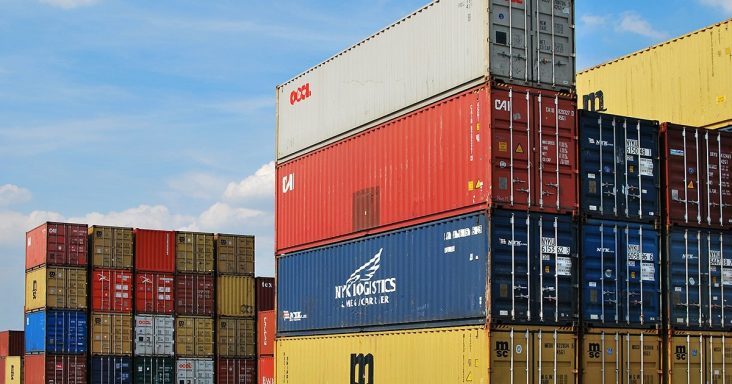Ocean carriers charge U.S. shippers more for delayed container returns, report shows
by July 6, 2022 4:18 pm 1,592 views

According to a recent report, the fees that U.S. shippers face for the delayed return of ocean shipping containers have risen since the start of the pandemic and are the most expensive in the world.
The report by online container marketplace Container xChange shows ocean carriers charge demurrage and detention fees when their containers are not returned in time. Shippers are charged for the delayed return of the containers. The fees are charged per container, per day.
The report shows the highest fees are being charged at five U.S. ports, with the Port of New York facing the highest charges at $3,182 per container. The second- through fourth-most expensive are in California, including Long Beach, Los Angeles and Oakland. The Port of Savannah, Ga., was No. 5.
In May, the average charge levied by carriers on customers two weeks after a box was discharged from the vessel at the Port of Long Beach was $2,730 per container, up from $2,638 in the same month in 2021. Over the same period, the charge at the Port of Los Angeles rose to $2,672, from $2,594 per container.
The charges at the five U.S. ports were over two to three times more expensive than Hong Kong, which was ranked No. 7 globally, and at least 20 times more expensive than Asian container hubs, such as Dalian in China and Busan in Korea.
Globally, the average fees have fallen from the record highs of 2021 but remain 12% higher than pre-pandemic levels. The global average charges levied by carriers on customers two weeks after the cargo was discharged from the vessel rose by 38% for standard-sized containers, from $586 in 2020 to $868 in 2021. So far in 2022, the average charges have declined by 26% to $664.
Recently, Congress approved the Ocean Shipping Reform Act that gives the Federal Maritime Commission more power to act on the charges and shifts the burden of proof on the reasonableness of the fees to the ocean carriers instead of shippers, according to the report.
“Throughout this pandemic, as shipping costs have soared and inflation has become a threat to the U.S. economy, the focus on container line behavior by politicians and regulators has magnified,” said Christian Roeloffs, co-founder of Container xChange. “U.S. agricultural shippers have been particularly outspoken about their inability to find affordable empty containers for exports. But importers have been equally outraged by what many believe has been profiteering on (demurrage and detention) charges by container lines. Some have started legal actions against carriers.”
Roeloffs added that President Joe Biden’s administration addressed the charges in the new law, “and we’re now waiting to see how this will be implemented and whether it will change shipper or carrier behavior significantly.”
According to the Container xChange report, the charges vary by carrier and by region. Cosco has the lowest charges ($322), while Yangming has the highest fees ($718). By region, the United States has the most expensive charges at an average of $2,692. Rounding out the top five most expensive countries or regions are Europe ($549), India ($482), China ($453) and the Middle East ($407).
The report also noted the variations in the number of free days carriers allow before the charges apply.
According to Drewry Shipping Consultants Limited, “when it comes to allowing free time, shipping lines that have less vessel capacity and a smaller equipment fleet are likely to charge more than those who can offer greater economies of scale. Furthermore, lines with better equipment management can also proactively promote end-to-end solutions, such as carrier haulage, which also frees up equipment and reduces cost to end users.”
Recently, Lowell-based carrier J.B. Hunt Transport Services Inc. established a long-term, multi-vessel agreement with carrier Swire Shipping Pte. Ltd. to transport J.B. Hunt’s new intermodal containers and provide customers with cargo transportation from Asia.
“This is yet another example of our people listening to the needs of customers and developing a creative solution to efficiently deliver on their capacity needs,” said John Roberts, president and CEO of J.B. Hunt. “It is our honor to name two of the vessels helping us charter new waters this year after the original visionaries who knew the potential of what our company would be.”
Recently, cargo vessel Johnelle docked at the Port of Everett in Washington with more than 250 new containers for the expansion of J.B. Hunt’s intermodal fleet. A second cargo vessel, the Johnnie Bryan, is expected to dock this month at the Port of Hueneme in California with additional containers.
Johnelle Hunt and her late husband Johnnie Bryan Hunt co-founded J.B. Hunt Transport Services.
Under the agreement with Swire, J.B. Hunt will have ongoing cargo shipping opportunities available from the Shenzhen, Qingdao and Shanghai markets in China to ports in California and the Pacific Northwest. According to a news release, the planned moves will help customers alleviate supply chain issues, such as equipment dislocation and fluidity, dwell time and demurrage by streamlining the ocean transport and transloading process.
“We’re really solving for two very big challenges with this agreement,” said Darren Field, president of intermodal and executive vice president at J.B. Hunt. “First, we’re adding intermodal capacity, which will provide customers with more opportunity to leverage the cost-savings and sustainability benefits that J.B. Hunt intermodal offers. Second, we’re greatly reducing the time it takes for customers’ freight originating overseas to be out for delivery in the U.S., something that has troubled the industry for years.”
According to J.B. Hunt, the vessels are owned and operated by Swire. They will continue to transport J.B. Hunt’s new intermodal containers as they become available.
